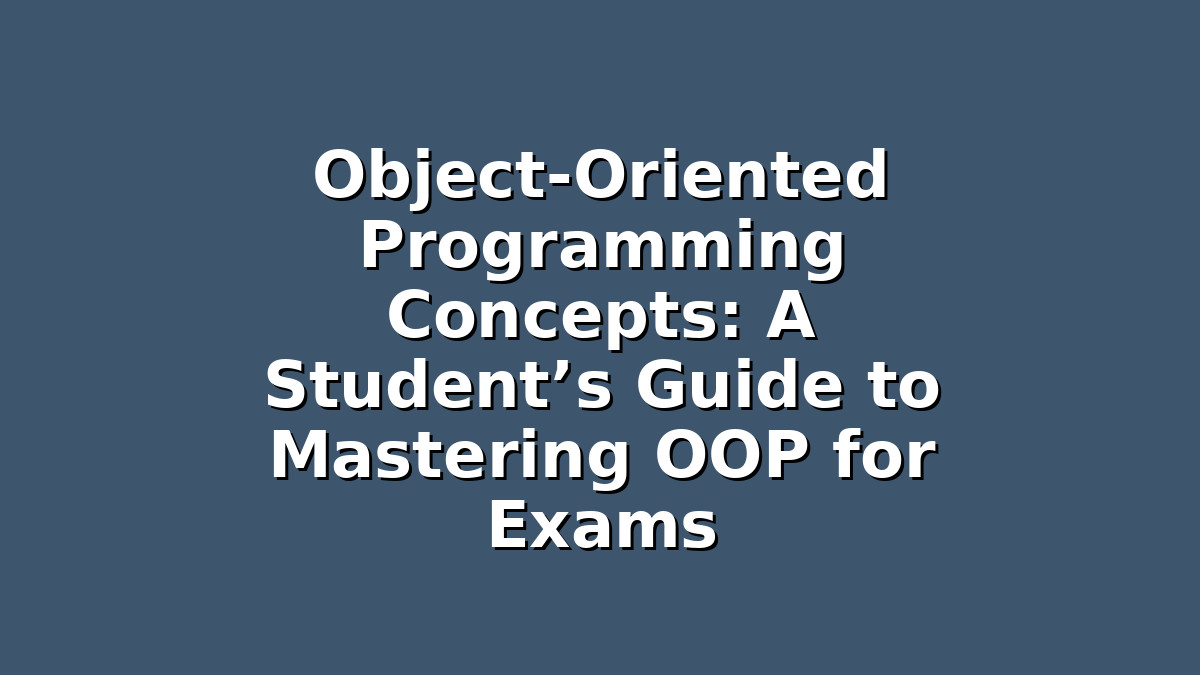If you’re a student preparing for exams or diving into programming courses, understanding Object-Oriented Programming (OOP) concepts is essential. OOP is a fundamental programming paradigm widely used in many programming languages such as Java, C++, Python, and more. Grasping its core principles not only helps you excel in your exams but also builds a strong foundation for practical coding skills in the future.
This guide will walk you through the key OOP concepts, offer study tips tailored for students, and share strategies to make your learning experience more effective and less stressful. Whether you’re new to programming or looking to reinforce your knowledge, these insights will help you approach OOP with confidence.
1. Understanding the Core Concepts of OOP: Classes, Objects, and Encapsulation
The heart of Object-Oriented Programming lies in its ability to model real-world entities through classes and objects. Before you start coding, it’s crucial to understand the terminology:
– Class: A blueprint or template that defines the properties (attributes) and behaviors (methods) common to all objects of that type.
– Object: An instance of a class, representing a specific entity with actual values for the attributes.
– Encapsulation: The concept of wrapping data (attributes) and methods that operate on the data into a single unit or class and restricting access to some components.
Study Tips:
– Create flashcards: Write down definitions and examples of classes, objects, and encapsulation on flashcards. Reviewing these regularly will reinforce your memory.
– Relate to real life: Think of a class as a “Car” blueprint, and each car you see on the road as an object. This mental model helps you understand abstraction and encapsulation better.
– Practice diagrams: Draw UML class diagrams to visualize how classes and objects relate. Visual aids are helpful for recalling concepts during exams.
Understanding these basics allows you to see how OOP organizes code efficiently and promotes reusability, which is often a key exam topic.
2. Mastering Inheritance, Polymorphism, and Abstraction with Practical Examples
Once you grasp the basics, the next step is to dive into the three pillars of advanced OOP concepts:
– Inheritance: Enables a new class (child or subclass) to inherit properties and methods from an existing class (parent or superclass), promoting code reuse.
– Polymorphism: Allows objects to be treated as instances of their parent class rather than their actual class, typically through method overriding or interfaces.
– Abstraction: Focuses on hiding complex implementation details and showing only essential features to the user.
Study Tips:
– Write simple code snippets: Create small programs demonstrating inheritance (e.g., a “Dog” class inheriting from an “Animal” class), polymorphism (overriding a method like `makeSound()`), and abstraction (using abstract classes or interfaces). Hands-on practice makes these abstract ideas concrete.
– Use comparison tables: Make tables comparing inheritance, polymorphism, and abstraction highlighting their purpose, benefits, and how they differ.
– Explain out loud: Teach these concepts to a friend or even to yourself out loud. Explaining ideas in your own words helps deepen understanding and spot gaps in knowledge.
Remember, many exam questions ask you to differentiate between these concepts or write code snippets that demonstrate them. Understanding their use cases and syntax is vital.
3. Effective Study Strategies to Excel in OOP Exams and Assignments
OOP can seem overwhelming at first, but with the right approach, you can master it efficiently. Here are strategies tailored to help students prepare effectively:
– Break down complex topics: Instead of tackling everything at once, focus on one concept at a time. For example, study encapsulation thoroughly before moving on to inheritance.
– Practice coding regularly: Programming is a skill best learned by doing. Use online coding platforms or your course’s IDE to write OOP examples every day. Even rewriting class definitions or inheritance hierarchies helps cement your understanding.
– Review past exam papers: This familiarizes you with question patterns and highlights which concepts are frequently tested. Practice writing answers within a time limit to simulate exam conditions.
– Join study groups or forums: Discussing problems with peers can clarify doubts and expose you to different ways of thinking. Online forums like Stack Overflow or programming subreddits are also great for quick help and advice.
– Use mnemonic devices: For example, remember the acronym “A PIE” — Abstraction, Polymorphism, Inheritance, Encapsulation — to recall the four main pillars of OOP.
– Stay consistent and positive: Programming takes time to master. Don’t get discouraged by initial difficulties. Celebrate small victories, like successfully creating your first class or debugging a tricky inheritance issue.
Conclusion
Mastering Object-Oriented Programming concepts is a valuable skill that will serve you well throughout your programming journey and beyond. By focusing on understanding classes, objects, encapsulation, inheritance, polymorphism, and abstraction, and applying effective study techniques, you’ll be well-prepared for your exams and assignments.
Remember, the key is consistent practice and relating abstract concepts to real-world examples to solidify your understanding. Stay curious, keep coding, and trust that your efforts will pay off. With dedication and the right approach, OOP won’t just be a subject you pass — it will become a powerful tool in your programming toolkit.
Good luck, and happy studying!

Responses